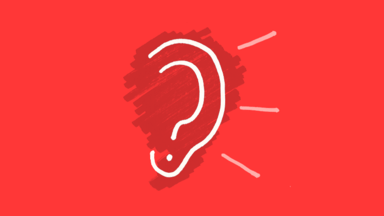About listening
Becoming a more empathic and user-centered designer is about gaining a better understanding of people. And that starts with listening.I’m not just talking about listening in a design research environment either. But at every opportunity — with clients, users and colleagues.Especially with colleagues.

I’ve been involved in mentoring over the last year as the design team atMade by Many has grown a little. Hiring designers early in their careers means it’s incredibly valuable to share knowledge, experiences and perspectives to help them grow. It’s especially important to listen to them too.
I know this first-hand from my time spent at the BBC as part of their design trainee scheme. I got regular time with senior designers whom I felt were interested in where my learning and career was heading. They built up my confidence and approach to design which meant I got to do work that I’m incredibly proud of (some of it is still online some 5 years on).
The benefits of mentorship are clear — but these benefits are often focussed on what the mentee gets out of the experience. What is often less said is what the mentor gets out of it. And as a mentor, I’ve benefitted shed loads.
The benefits of mentoring work both ways
Mentoring has helped me become a better active listener, gaining more practise in reading a conversation. To pick up on tone of voice, body language, knowing when to ask more questions and when to back-off. It’s made me better at understanding how I could offer help (without doing it for them) and when to seek advice from others to get the help or perspective they need.
It’s helped me become a good observer, spotting when actions really do speak louder than words. Understanding motivations, ambitions and unearthing opportunities to improve.
Most importantly it’s helped me take a step back from my day to day. To get inspiration from a different perspective, giving me a renewed energy for what I do.
Mentoring has made me a better user researcher
All the traits I outlined above make up a good mentor. But I feel these are all traits that make up a good user researcher too. Swap out the mentee for a user in the above and you aren’t far off how to conduct user interviews. They use the same skills and mindset.
Mentoring and user research both hinge on understanding people. What better way to start than by listening.
Continue reading
Hackaball named by TIME as one of the best inventions of 2015
What a thrilling end to the week – Hackaball has been recognised by TIME as one of the best inventions of 2015 alongside Google Cardboard and the Tesla Mo...
Coding for humans, developers and other animals: EpicFEL 2015
The world of front-end development is progressing so fast that it’s impossible to keep up.Or: Modern front-end development involves so many tools, framewo...
Putting the “Well” Into Wellbeing at Work
Wellbeing in the workplace: it's a nice idea, and no doubt something many others are talking about in the wake of World Mental Health day.For those of us ...


